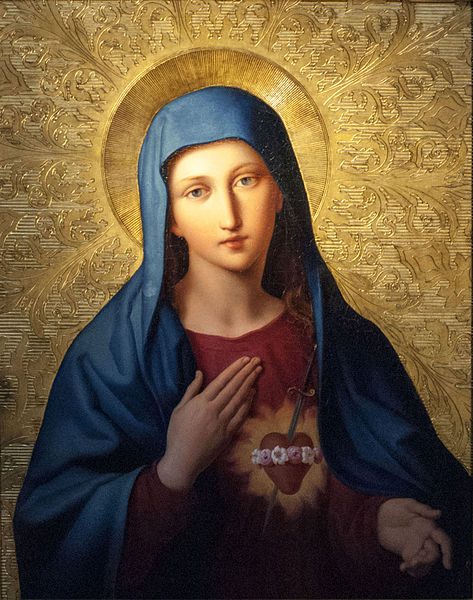The Heart of Mary, by Leopold Kupelwieser (1796-1862). Photograph by Diana Ringo at Peterskirche, Vienna, Austria (9-22-13) [Wikimedia Commons / Creative Commons Attribution-Share Alike 4.0 International license]
* * *
This is a chapter from my book, Biblical Catholic Apologetics (2013)
* * * * *
My friend, Mary Kochan, editor of the Catholic Lane website, wrote an article in July 2011, entitled, “Catholics, Please Say Something About Jesus!” Even before I read it, my “sociological” curiosity was greatly piqued by her statement introducing the article to me, in an advertising e-mail:
Well this is the first time this has ever happened: I managed to write an article, reaction to which seems to split right along the lines of converts vs cradle Catholics, with the converts saying I’m right and the life-long Catholics saying I’m wrong.
As so often in my life, and specifically in my apologetics, my own opinion could not be neatly characterized or classified. I (as a convert, myself) came down sort of in the middle, but closer, I think, to the view that Mary says is being expressed by cradle Catholics. I think I understand why there is such a split.
In my opinion, the abiding concern of the converts is to stress the ecumenical aspect of Mariology: we need to use language that Protestants understand, to find common ground. And in this context that means mentioning Jesus more than Mary, and especially trying to do so in the face of death, and in talking about matters having to do with eschatological salvation: that is, the attainment of heaven. Vatican II stresses this, and it is a good thing. I am very big on both Vatican II and ecumenism, as readers of mine are well aware.
On the other hand, I think what cradle Catholics are saying is that Marian devotion and Mariological doctrines are perfectly legitimate and biblical. They simply need to be explained in greater detail to Protestants, who are often quite unfamiliar with them. We mustn’t give them up because they are misunderstood and distorted and dimly comprehended.
Mariology is sort of “advanced Christianity.” One has to learn and arrive at a place where one resonates with it and comprehends it. As I have said before: you can’t understand calculus or trigonometry before first mastering arithmetic and algebra. The spiritual life and theology also have beginner’s and advanced stages.
That’s why I am mostly “siding” with the “cradle Catholics” on this one, because, as an apologist, my job is to defend orthodox, traditional Catholicism, against all objections. Obviously, Mariology often offers the opportunity to do that. And I love the challenge, just as I have a great devotion to Our Lady myself.
We all need grace, and we all need prayers to attain heaven. Mary’s are the most powerful of all creature’s prayers. And this is a perfectly biblical concept, according to James 5:16: “. . . The prayer of a righteous man has great power in its effects.” In James 5:15 it says that “the prayer of faith will save.” If a prayer can save a man, and (as James is arguing), if in general the prayers of righteous people have more power and effect (KJV: “availeth much”), then Mary’s prayers can save all the more, since she was without sin and the Immaculate Mother of God.
It all makes perfect sense. Protestants will try to deny that Mary was sinless, yet the Bible says she is “full of grace” (Luke 1:28), and since in the Bible grace is the antithesis of sin, then it follows that she was sinless.
Or Protestants will argue that the saints in heaven neither hear our prayers nor pray for us. Many biblical indications contradict that; for example, the “cloud of witnesses” in Hebrews 12:1 and souls praying for those on the earth in Revelation 6:9-11, and “elders” having the “prayers of the saints” in heaven and presenting them to God (Revelation 5:8), among other indications.
Merely to mention the blessed Virgin Mary in the context of death is not necessarily at all somehow pitting Mary against Christ or even (heaven forbid) placing her higher than our Lord in the scheme of things. In other words, allowing ignorance, I am contending that an informed Catholic could speak in such a way, and that this would not in the slightest entail any real or implied or even deduced denigration of our Lord Jesus. It can be thoroughly defended, not only from internal Catholic criteria, but from Holy Scripture.
Catholic communion of saints presupposes the primacy of Jesus, just as historic Mariology does. It was the presupposition that Jesus was Lord and God that was behind the definition of “Mother of God” (Theotokos) at the Council of Ephesus in 431. The whole idea was to protect His divinity: not to over-exalt Mary.
For that reason and others Martin Luther, John Calvin, and other Protestant founders had no problem with continuing to call her the Mother of God, or to believe in her perpetual virginity. Antipathy to those things comes from post-Enlightenment, post-liberal Protestantism, not historic “Reformation” Protestantism.
Luther (following St. Thomas Aquinas) believed in a slightly different version of the Immaculate Conception, and Swiss “reformer” Heinrich Bullinger expressed belief in her bodily Assumption. Some historic Lutheran liturgies even held to Mary’s Assumption.
Likewise, Catholic devotional materials about the Blessed Virgin Mary presuppose that Jesus is the source of our salvation and our redeemer and Savior; but it goes on to great heights of veneration of Mary, because that is the fullness of our faith. Many Protestants misunderstand this? What else is new? That is not a cue for us to abandon historic Catholic devotional treasures and spiritual richness, or to spiritually “dumb down” our robust apostolic Catholic faith, but rather, to explain to them why these things are not outrageous and unbiblical, as they are often made out to be.
I have noted the horrified reaction of Protestants to some of the classic Marian devotional expressions, such as those from St. Louis de Montfort and St. Alphonsus Liguori; I’ve also examined the mariology of St. Maximilian Kolbe in the 20th century. I’ve shown at great length (in my book, “The Catholic Mary”: Quite Contrary to the Bible?) that none of these devotional expressions and outlooks denigrated our Lord Jesus’ glory and preeminence at all.
The problem, however, is that Protestant critics only cite the most expansive, flowery (what they erroneously consider blasphemous and idolatrous) examples of Marian veneration from their writing, while ignoring all the Christocentric references frm the same works (I acknowledged my readers’ intelligence enough to conveniently provide those also).
That gives a thoroughly distorted picture of the overall thought. It’s the classic out-of-context citation. In other words, the Protestant critics are giving the false impression that these works were exalting Mary almost to Godhood, while ignoring Jesus, whereas the actual truth of the matter is that they render to Jesus adoration, but to Mary high veneration. The books were about the Blessed Virgin Mary, so obviously she was in the foreground in terms of topical subject matter. But it doesn’t follow that she is being raised above Jesus.
I agree that we have to explain these things to Protestants and find common ground, as Vatican II urges, but we shouldn’t run from our own spirituality or be ashamed of it or try to deliberately minimize it. We should defend it as perfectly understandable and in accordance with the Bible, rightly understood. And that is what I have sought to do in my apologetics.
Prayer is something we do: hence in that sense it is a work. It’s not something that comes from God without anything to do with our free will cooperation. We produce it: it is, therefore, a work coming from us, though enabled by God’s grace, as all good things are. Why cannot such piety include a “work” such as asking the Blessed Virgin to intercede for our salvation? It assuredly does.
Within the biblical, Pauline paradigm of the organic connection between grace, faith, and works, it is perfectly acceptable and spiritually sensible to invoke Mary on behalf of our salvation: to ask her Son to have mercy on us and save us. We know that prayer is a very powerful avenue of grace: God’s grace without which we have no hope of salvation. Her prayers are more powerful than any other prayers from fellow creatures. The spiritually wise man, then, will invoke her for something of such paramount importance, seeing that our salvation is not absolutely assured at any time, as St. Paul expressly taught, even with regard to his own salvation.
I think both sides (converts and cradle Catholics) have valid points in this discussion. I would just say that we can’t bend so much to appeal to Protestants in their outlook that we cease to be what we are. This is how a dying man’s response case was presented in the article mentioned above:
I finally asked him one day, ‘If you died and stood before the Lord and He asked you why He should let you into heaven, what would you say?’” . . . you should know how our Catholic answered it: “I just ask the Virgin Mary to pray for me.”
Now, note that the question is about what the person would say in front of God in heaven. A Catholic is going to “talk like a Catholic” in front of God. He or she won’t stand there and think, “now how can I put this so that a Protestant will understand what I’m saying?”
Therefore, it is, by the nature of the case, rather a moot point to expect a Catholic man to reply to God as if he were talking to a Protestant. He can hardly modify his answer in such a case, when a Protestant is asking him what he would say to God. And since all agree that his answer is in accord with orthodox Catholic thought and legitimate Catholic Mariology (that presupposes Christology), I think it’s a bum rap: at least considered abstractly, apart from the man’s actual state of knowledge of his Catholicism.
I conclude, then, that there is nothing improper in his reporting what he would say, and reporting that he would answer like many a Catholic (and many a saint) would. One could go on to make a general case that Catholics need to stress Jesus more in talking to Protestants (and I readily agree with that). But the article is specifically criticizing the man for his answer, and I think I have shown that he was under no obligation in that particular instance to “talk in terms a Protestant would understand” since he was asked to reveal what he would say to God at the time of judgment. That makes it quite a different scenario from the usual run-of-the-mill Catholic-Protestant interaction.
I talk to Protestants in terms they can relate to all the time. I understand that. But there is a line we cannot cross: which would require us to not be what we are: Catholics. Being Catholic includes devotional practices that most Protestants don’t understand, and that many (sadly) never will comprehend, because they don’t make the effort to ever do so.
I’d like to cite Blessed John Henry Cardinal Newman. Note that he speaks in terms precisely in a way that (so we hear) Catholic converts are objecting to en masse. Yet Cardinal Newman is one of the most famous converts to Catholicism, and this comes from a mere four years after that event. He first talks about Mary at the hour of our deaths, then at the end, according to Catholic presuppositions, mentions our Lord Jesus, too (Who is never intended by the Church to be excluded by Marian devotion or intercession).
What many Protestant polemical pieces would do here is not cite the final sentence, so as to leave the impression that a Catholic relies wholly on Mary for salvation, and not Jesus. But the Catholic outlook is habitually “both/and.” Jesus saves (of course); in doing so He also utilizes human beings in order to bring the salvation of souls about: Mary foremost among them.
. . . interest your dear Mother, the Mother of God, in your success; pray to her earnestly for it; she can do more for you than any one else. Pray her by the pain she suffered, when the sharp sword went through her, pray her, by her own perseverance, which was in her the gift of the same God of whom you ask it for yourselves. God will not refuse you, He will not refuse her, if you have recourse to her succour. It will be a blessed thing, in your last hour, when flesh and heart are failing, in the midst of the pain, the weariness, the restlessness, the prostration of strength, and the exhaustion of spirits, which then will be your portion, it will be blessed indeed to have her at your side, more tender than an earthly mother, to nurse you and to whisper peace. It will be most blessed, when the evil one is making his last effort, when he is coming on you in his might to pluck you away from your Father’s hand, if he can—it will be blessed indeed if Jesus, if Mary and Joseph are then with you, waiting to shield you from his assaults and to receive your soul.
(Discourses to Mixed Congregations, 1849, Discourse 7: “Perseverance in Grace”)
We can go right to Jesus if we like, or we can ask a holy person to do so on our behalf. According to the Bible itself, and Catholic teaching on merit, Mary’s prayer would have much much more power and efficacy than ours would. So we may ask her to pray for us rather than ask Jesus ourselves. The Protestant error is to assume that this act somehow implies a superiority of Mary to Jesus, or else presupposes that Mary is giving the grace (as the original source) and answering the prayer herself, rather than interceding.
Neither follows. An ignorant Catholic may think that, but it is not a tenet of orthodox Catholic Mariology; and we all know that Protestants attack not only the Mariology of misinformed Catholics, but also the most fully developed Mariology, up to and including even a Doctor of the Church (St. Alphonsus). It’s not just excess or corruption that they detest, but also orthodox Catholic devotion.
Protestants typically think in “either/or” terms, so that whenever Mary is mentioned, and Jesus doesn’t occur in the same sentence, then automatically, the Catholic becomes a Mary-worshiping idolater who doesn’t know the slightest thing about Jesus.
But Catholics (i.e., those who have even the slightest familiarity with their faith) assume that the Lordship and divinity of Jesus is presupposed in all talk about Mary. It’s not an issue. Of course we know that. It’s like any field of knowledge: the basics are assumed and not talked about much once a person gets to a certain level of advancement.
By my last sentence I don’t mean all talk about Jesus altogether ceases, but rather, I specifically meant with regard to the issue of Mary’s intercession. When a Catholic is referring to that (or asking for that) he or she doesn’t have to always mention Jesus, as if the mere mention of Mary somehow wipes out the role of Jesus (not Mary) as the ultimate answerer of the prayer. It’s presupposed.
If Protestants don’t understand this crucial consideration, then it needs to be explained to them, rather than Catholics watering-down and dumbing down their devotions and prayer requests because someone outside the practice and almost wholly unfamiliar with it is out to sea in comprehending what is going on.
All we hear about is how ignorant Catholics are, but I can assure anyone (having been in both camps) that there is plenty of ignorance to go around. Protestant ignorance about actual Catholic Marian teachings is often quite as mistaken and dead-wrong as the Catholic Marian devotional excesses that are so vilified. It works both ways. Protestants are often utterly ignorant of what we believe and how we habitually talk about what we believe about Mary, intercession, grace and its distribution, etc.
I do fully appreciate the urge to emphasize and talk about Jesus more in Catholic circles. That’s not my beef at all. I’m only saying that by the same reasoning that we ought to discuss Jesus more, so also Protestants ought to learn a little of how we approach the Blessed Virgin, and not make outrageous assumptions about the individual Catholic and Church teaching based on the mere mention of Mary without our Lord Jesus also being in the same sentence.














